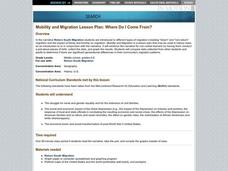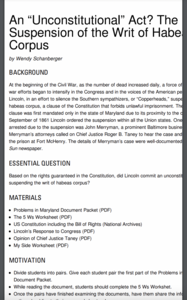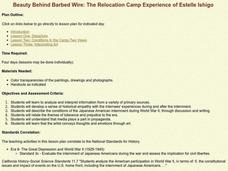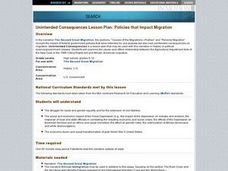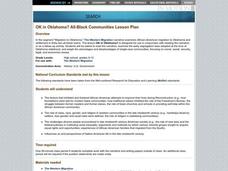Curated OER
Defining moments: Framing the Problem
Students create a problem framing chart to examine the issues surrounding the decision to inter Japanese Americans during World War II. They respond to a set of questions using perspectives from different parties involved in the decision...
Curated OER
Lesson Plan on Tolerance
Students, through discussion, internet and video resources, study the history of Northern Ireland and the religious segregation between Catholics and Protestants. They evaluate the current political situation and predict what the future...
Curated OER
Undercover in the Secret State
Learners examine the current conditions in North Korea. They view and analyze a CNN documentary, research a dissident, answer and discuss questions about the documentary on conditions in North Korea, and identify the technology used by...
Albert Shanker Institute
Economic Causes of the March on Washington
Money can't buy happiness, but it can put food on the table and pay the bills. The first of a five-lesson unit teaches pupils about the unemployment rate in 1963 and its relationship with the March on Washington. They learn how to create...
Curated OER
Resistance to African American Education During and After the Civil War
Young scholars research a web site of primary documents to determine the level of support among whites in for the education of African Americans during Reconstruction.
Paul Hudson
SPQR Latin Dictionary and Reader
Searching for an incredibly thorough Latin app? Look no further! Latin learners will be quite satisfied with the collection of texts, three dictionaries, customizable flashcards, assessment options, and other features that are right at...
Curated OER
Turbulent Times of the Sixties
Students explore 1960's America. In this American history lesson, students read about and research 1960's political and entertainment figures, social activism, the Civil Rights Movement, and environmentalism as they complete writing and...
Pulitzer Center
The Crisis in the Ivory Coast
Through reading a variety of news articles and other informational texts, learners discover the political turmoil and intense ethnic and religious tensions that envelop the Ivory Coast today. Class members research the historical...
Curated OER
WHERE DO I COME FROM?
Learners analyze the struggle for racial and gender equality and for the extension of civil liberties, the social and economic impact of the Great Depression, and the economic boom and social transformation of post-World War II United...
Roy Rosenzweig Center for History and New Media
The Revolutionary Times as Seen Through the Eyes of Women
The role of women before and during the American Revolution changed dramatically. To gain an understanding of these changes, middle schoolers analyze primary source documents, including letters from women that supported the patriot cause...
Curated OER
An "Unconstitutional" Act? The Suspension of the Writ of Habeas Corpus
Students explore the implications of habeas corpus. In this Civil War lesson, students analyze the writ of habeas corpus by Lincoln during the war. Students examine primary sources from Lincoln and Chief Justice Taney. Students design...
Curated OER
Emancipation Proclamation
Students analyze key components of a portrait and relate the elements to the historical context. In this lesson students evaluate the "Emancipation Proclamation" and it's significance.
Curated OER
The Supreme Court
Students examine the Fourteenth Amendment. In this Supreme Court lesson, students define due process and equal protection as they analyze the impact of the amendment and the Supreme Court on workers' rights in the early 20th century....
Curated OER
Beauty Behind Barbed Wire: The Relocation Camp Experience of Estelle Ishigo
Eighth graders study World War II through art.
Curated OER
Unintended Consequences: Policies that Impact Migration
Students examine the cause-and-effect relationship between the Agricultural Adjustment Acts of the New Deal or the 1965 Voting Rights Act and African-American migration. They write an essay evaluating the effectiveness of the Voting...
PBS
Abraham Lincoln: Man versus Legend
Abraham Lincoln was one of the greatest presidents ever ... right? Scholars research the accomplishments and struggles of the Lincoln presidency. They uncover facts, materials and information via video clips, primary, and secondary...
Curated OER
Why Do Governments Exist? Locke, Hobbes, Montesquieu, and Rousseau
Here is a great secondary source reading that includes the primary ideas and philosophies of the famed Enlightenment philosophers: Thomas Hobbes, John Locke, Charles Montesquieu, and Jean-Jacques Rousseau. In additional to discussing...
PBS
Hidden Messages in Spirituals
Slaves laboring in the cotton fields of the old South singing joyously may have convinced overseers that their workforce was happy and content, but in truth, these spirituals contained secret codes. After viewing a short video about...
Curated OER
Lincoln's Political Theology
Students continue to examine the events of the Civil War. Using primary source documents, they identify how Lincoln's religious beliefs affected the decisions he made during this time period. They discuss the meaning of his "Meditation...
Curated OER
Isabella Fogg: A Woman on the Field
Eighth graders read and discuss Isabella Fogg's letter to John Hathaway during the Civil War. They review the roles of women during the civil war. They decide on a question they would like to research. They try to answer their question...
Curated OER
U. S. History Worksheet, #69
For this United States history worksheet, learners utilize a word bank of 10 terms or phrases to answer 10 fill in the blank questions about the Civil War. A short answer question is posed to students as well.
Curated OER
Why Did the North Fight?
Students evaluate interpretations of causes for Northern entry into the Civil War by accessing several primary sources.
Curated OER
OK in Oklahoma? All-Black Communities
Students read to discover the African-American migration to Oklahoma following the Civil War and the eventual settlements of thirty-two all-black towns. To present their findings, students will write position papers and participate in...
Curated OER
"Martial Law in Hawaii After the Attack on Pearl Harbor"
Students explore the concepts of martial law, writ of habeas corpus, due process, discovery and human and constitutional rights during World War II. They assess the roles and responsibilities of government leaders and citizens during...








